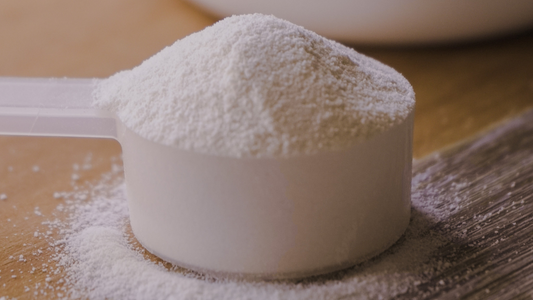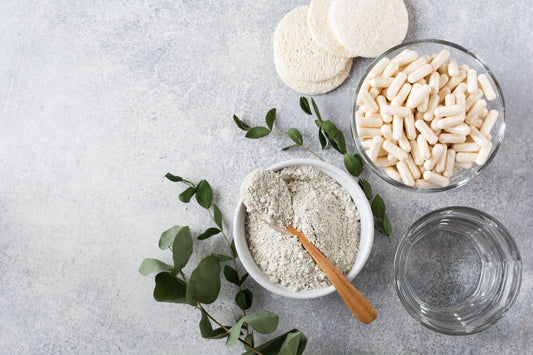5 Tips to Naturally Reduce Wrinkles Under Your Eyes

Eye wrinkles, more affectionately known as fine lines, creases, and crow’s feet, are typically among the first signs of aging. For some people, these newfound changes are nothing more than a sign of wisdom that should be embraced and not erased.
While others view aging skin as a nuisance, preferring to reduce the appearance of wrinkles no matter the cost. Whether you mind the effects of aging or not, most people would agree that they want to age well, with grace, and at a fair pace. This article will explain why your skin changes, and five tips to naturally reduce the appearance of wrinkles under your eyes.
What Causes Eye Wrinkles Anyway?
Eye wrinkles are a result of thinning of the connective tissue under the eyes. Think of young skin as a newly built brick wall, with firm, structural integrity. As we age, those ‘bricks’ or building blocks, namely collagen and elastin, start to naturally break down, causing the matrix of the skin to become less dense and more prone to structural defects, such as fine lines and wrinkles. Although we may not notice visible signs of aging until our early 30s, internal, natural collagen production begins to decline 1% per year after the age of 20, which is much younger than you might expect. [1]
So, is there anything you can do to address the natural decline in collagen levels and the inevitable wrinkling under the eyes? The truth is, unless you’re signing up for a specialized cosmetic procedure or injection, eye wrinkles aren’t going to magically disappear, but thankfully there are several natural things you can do to support your skin as you age. Here are five nutritionist-approved tips to reduce and improve (not erase!) the appearance of wrinkles under the eyes:
Tip 1: Protect Yourself from the Sun
Sunscreen and limiting sun exposure is your first line of defence for protecting your eyes against aging. Research shows that sun damage can cause a host of skin related issues, including premature aging and wrinkling. [1]
Interestingly, the New England Journal of Medicine published a striking image of a 69-year-old man who had 25 years of gradual thickening and wrinkling of the skin on the left side of his face. The study revealed that he had driven a delivery truck for over 20 years and the ultraviolet UVA rays penetrated through the window glass, and slowly, over time caused more wrinkles on the exposed side of his face [2].

To protect your skin (and the delicate skin under your eyes), dermatologists recommend using regular, daily sunscreen (even in the winter!) with an SPF of 30 or higher for people of all skin types. [3,4]
Tip 2: Nourish Your Body From Within
Since your skin is about 75% collagen [5], it’s important to supply your body with the building blocks it needs to make enough collagen. To maintain healthy skin for example, the body needs a substantial amount of new collagen (27 g) every day [6], so how can you make sure your body has what it needs to keep up with this collagen demand? Your diet plays a key role.
Here’s how you can use food to support, restore, and protect collagen in your skin:
- Eat vitamin C rich foods like citrus fruits, bell peppers and berries. Vitamin C is a potent antioxidant that helps regenerate and restore damaged collagen
- Eat protein in every meal – proteins contain the building blocks for collagen production
- Eat antioxidant rich foods containing lycopene, beta-carotene, and anthocyanins (in other words, red, orange, and purple fruits and vegetables) as these, combined with sunscreen, can help increase your skin’s natural defence against UV rays and premature aging [7,8]
Tip 3: Manage Stress
You’ve probably heard it before – stress affects your health. But did you know that it can also affect your skin health? Clinical studies show that stress can increase your cortisol levels, which in turn can degrade collagen and cause more pronounced skin wrinkling. [9] But take heart! There are plenty of things you can do to help cope with stress.
Many people have found adjusting their daily routine to include simple activities such as deep breathing, exercising, or taking a bath, has really helped them to stay calm and carry on. Then of course there are more involved strategies such as cognitive behavioural therapy or seeking a medical professional to help you manage stress. Regardless of the strategy you choose, there is no doubt that managing stress is easier said than done. However, it’s well worth the effort, even if it’s just for vanity’s sake.
Tip 4: Try Retinol
There is an abundance of skincare options available, and although a detailed discussion of specific products is beyond the scope of this article, there is one active ingredient that has stood the test of time – retinol. Topical retinols have been well researched and because of that are often recommended by dermatologists as the first line of defence against eye wrinkles. [10-12]
Thankfully retinol products are very accessible and can be found in plenty of over the counter under eye creams. If you need further guidance, talk with your dermatologist to find out which retinol products are right for you.
Tip 5: Consider Collagen Supplements
Since your skin is mostly made of collagen, supporting your body’s natural collagen production makes sense. Step two, outlined above, highlighted some key nutrients your body needs to make collagen. However, unfortunately, as we age, our bodies are no longer as efficient at processing nutrients, so we may require a supplemental source to help keep up with the body’s collagen demands.
In terms of supplements, a 2014 double-blind, placebo-controlled trial followed 114 women who were randomized to receive collagen or placebo. The results show a statistically significant reduction in eye wrinkles after just four weeks of supplementation with bovine sourced bioactive hydrolyzed collagen peptides (Verisol®) compared to placebo. [13]
Interestingly marine collagen studies have shown similar skin health benefits. One 2020 clinical study followed 44 women and revealed that supplementation with marine sourced bioactive hydrolyzed collagen peptides (Collactive™) resulted in a 19% reduction in deep wrinkles after just four weeks, and an 8% increase in skin hydration after three months of supplementation. [14]
The clinically researched collagen used in these studies, namely Verisol and Collactive (found in Collagen30® tablets, gummies and Marine Collagen30®) contain high amounts of glycine, lysine and proline which can increase collagen production deep within your skin.
Final Thoughts on How to Reduce Eye Wrinkles
So, what can you do to naturally maintain healthy skin under your eyes as you age? Practice sun safety, consume key nutrients for collagen production, manage stress, try retinol products, and consider collagen supplements. Combining these tips with a balanced diet and regular exercise can help you stay natural and beautiful as the years go on.
References :
- Reilly DM, & Lozano J. Skin collagen through the life stages: Importance for skin health and beauty. Plast Aesthet Res. 2021; 8:2
- Gordon, JRS, & Brieva, JC. Images in clinical medicine. Unilateral dermatoheliosis. N Eng J Med. 2012; 366 (16).
- Sander M, Sander M, Burbidge T, et al. The efficacy and safety of sunscreen use for the prevention of skin cancer. CMAJ. 2020; 192(50).
- American Academy of Dermatology Association. (2020). Sunscreen FAQs
Retrieved from www.aad.org/media/stats-sunscreen - Bolke L, Schlippe G, Gerb J, et al. A Collagen Supplement Improves Skin Hydration, Elasticity, Roughness, and Density: Results of a Randomized, Placebo-Controlled, Blind Study. Nutrients. 2019:10: 2494.
- Melendez-Hevia E, De Paz-Lugo P, Cornish-Bowden A, et al. A weak link in metabolism: The metabolic capacity for glycine biosynthesis does not satisfy the need for collagen synthesis. J Biosci. 2009; 34(6):853-72.
- Stahl W, Sies H. B-carotene and other carotenoids in protection from sunlight. Am J Clin Nutr. 2012: 96(5): 1179S-85S.
- Wang LS, Stoner GD. Anthocyanins and their role in cancer prevention. Cancer Lett. 2008; 269(2): 281-290.
- Kahan V, Andersen ML, Tomimori J, et al. Stress, immunity and skin collagen integrity: Evidence from animal models and clinical conditions. Brain Behav Immun. 2009; 23(8): 1089-95.
- Kafi R, Kwak HSR, Schumacher WE, et al. Improvement of naturally aged skin with Vitamin A (retinol). Arch Dermatol. 2007; 143(5):606-12
- Harvard Health Publishing. (2022). Do retinoids really reduce wrinkles? Retrieved from https://www.health.harvard.edu/staying-healthy/do-retinoids-really-reduce-wrinkles
- Nathan, N. (2020). Drugstore skincare: science-backed anti-aging ingredients that don’t break the bank. Retrieved from https://www.health.harvard.edu/blog/drugstore-skincare-science-backed-anti-aging-ingredients-that-dont-break-the-bank-2020111121309
- Proksch E, Schunck M, Zague V, et al. Oral intake of specific bioactive collagen peptides reduces skin wrinkles and increases dermal matrix synthesis. Skin Pharmacol Physiol. 2014; 27(3):113-9.
- PLT Health Solutions. (2020). Collactive™ collagen complex nourishing beauty. Retrieved from https://www.plthealth.com/resources/collactive-hm-product-sheet
 Free returns & exchanges
Free returns & exchanges



